 Petzlover
Petzlover Bengal is originated from United States but German Rex is originated from Germany. Both Bengal and German Rex are having almost same weight. Both Bengal and German Rex has almost same life span. Both Bengal and German Rex has same litter size. Bengal requires Moderate Maintenance. But German Rex requires Low Maintenance
Bengal is originated from United States but German Rex is originated from Germany. Both Bengal and German Rex are having almost same weight. Both Bengal and German Rex has almost same life span. Both Bengal and German Rex has same litter size. Bengal requires Moderate Maintenance. But German Rex requires Low Maintenance
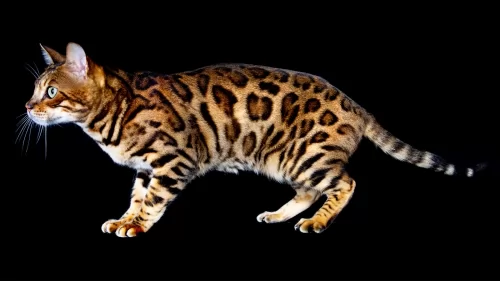 What an exquisite coat the Bengal cat has. It looks like the coat of a wild cat and can have spots, marbling, and rosettes, but it is domesticated, developed from hybrids – the spotted Egyptian Mau and the Asian Leopard cat.
What an exquisite coat the Bengal cat has. It looks like the coat of a wild cat and can have spots, marbling, and rosettes, but it is domesticated, developed from hybrids – the spotted Egyptian Mau and the Asian Leopard cat.
It is the only domestic breed of cat that has rosette markings. It is Jean Mill of California that you associate the Bengal cat with, and she conducted a number of graduate classes in genetics.
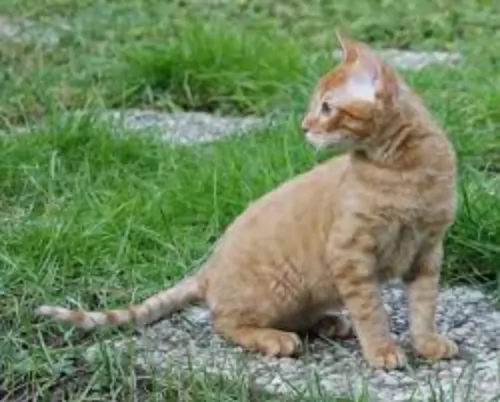 The cat originates from Germany and was developed in about the 1950s. Dr. Rose Scheuer-Karpin found a frizzy-haired black and white cat and chose to breed her.
The cat originates from Germany and was developed in about the 1950s. Dr. Rose Scheuer-Karpin found a frizzy-haired black and white cat and chose to breed her.
So as to fix the frizzy hair gene, it was decided to mate the cat further and this was the start of the German Rex.
It was later crossed with the Cornish Rex. The cats were recognized by the International Feline Foundation, but the Cat Fanciers' Association still associates the breed with the Cornish Rex.
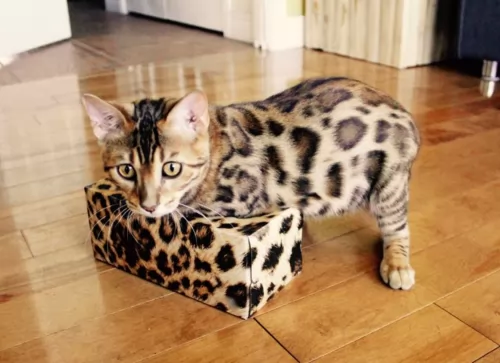 The Bengal looks like a wild cat and it can weigh up to 7kg. It can reach a height of 70cm with long, muscular legs and almond-shaped eyes which are green or blue.
The Bengal looks like a wild cat and it can weigh up to 7kg. It can reach a height of 70cm with long, muscular legs and almond-shaped eyes which are green or blue.
When it comes to the coat of the Bengal cat, it has a wide variety of colors and patterns. The cat can be brown, black, red, grey, spotted, clouded, ticked or rosette.
There are Bengal breeders that claim that their Bengals are hypoallergenic so that they won’t cause an allergic reaction with their owers. This is something that hasn’t been scientifically proved and in fact many will say that there isn’t such as thing as a hypoallergenic cat.
The Bengal is a medium to large-sized cat, being long and lean and muscular. As a low shedder, it is believed the Bengal is a hypoallergenic cat breed – a cat less likely to cause an allergy with its human owners.
When you bring a Bengal cat into your home, you’ll find they are energetic, smart, and playful and they love cavorting around in water.
People who have owned a Bengal say that the cat is friendly and that it enjoys interacting with humans. They’re cats capable of forming strong bonds with their human family, becoming affectionate and loyal. They in turn want to receive lots of loving attention.
They’re intelligent too and are quick to learn. You have to remember that these are part wild cat and that they are only classed as tame from the 4th generation (T4).
The cat has wild traits so it is only natural that it likes to hunt so don’t be alarmed when your Bengal presents you with dead mice, moles, and birds.
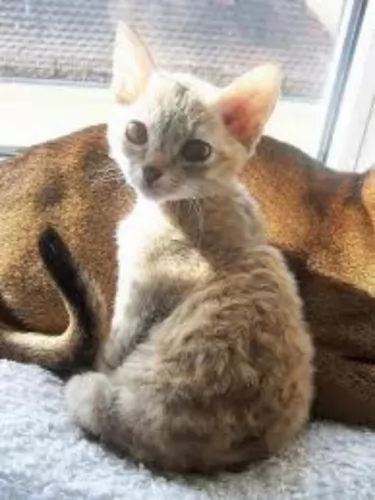 This is a medium-sized, muscular domestic cat with a well-developed chest. The cat can weigh between 3 and 6kg.
This is a medium-sized, muscular domestic cat with a well-developed chest. The cat can weigh between 3 and 6kg.
The legs are fairly long and slender but strong and the tail is thick and furry with a rounded tip. The head is round and the ears are large. The eye colors are always related to the coat color. The coat is short and silky and in many colors and it has a tendency to curl.
These are friendly cats that form a strong bond with their human owners, although they are friendly towards strangers too.
They’re intelligent, lively, and playful too and will fit in well to homes with children.
Because of their playful nature, you want to ensure you provide them with lots of entertaining, stimulating toys.
They’ve got balanced personalities and are known for being sociable, adapting to the lifestyles they find themselves in. They will also get on well with other pets in the home, and enjoy being both indoors and outside.
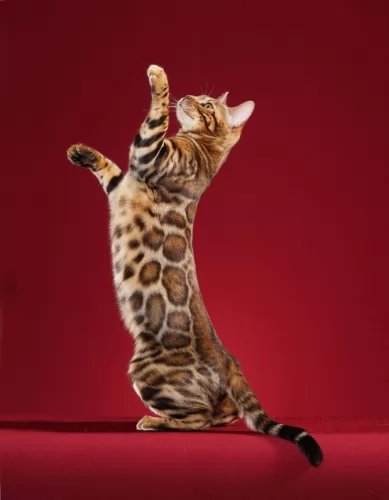 Bengal cats are intelligent and just like a dog he is clever at learning tricks and can even be taught things such as ‘sit’, ‘fetch’ or ‘lie down’. They actually make great companions as they are sensitive to their owner's moods and can even recognize human gestures and adapt their behavior to their owner's mood.
Bengal cats are intelligent and just like a dog he is clever at learning tricks and can even be taught things such as ‘sit’, ‘fetch’ or ‘lie down’. They actually make great companions as they are sensitive to their owner's moods and can even recognize human gestures and adapt their behavior to their owner's mood.
They’re vocal cats too and they like to communicate about their needs, being able to meow in different tones. They’re active cats and they want active owners – those who can spend time with them playing and even going on walks and hikes.
The Bengal certainly is a wonderfully companionable cat.
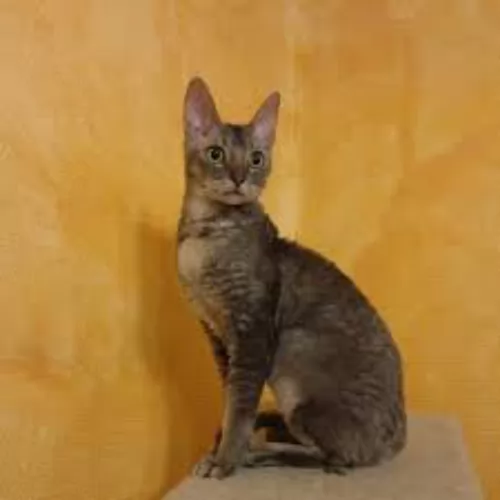 Your German Rex is everything you want in a pet. He is a cat that loves his human family and is prepared to offer loyalty and love in exchange for the same.
Your German Rex is everything you want in a pet. He is a cat that loves his human family and is prepared to offer loyalty and love in exchange for the same.
He is adaptable and undemanding. Before you invest in such a cat, understand that interaction from you is highly important, so if you don’t have time for an adult pet, it would be kinder not to get this particular cat breed as they crave lots of attention,
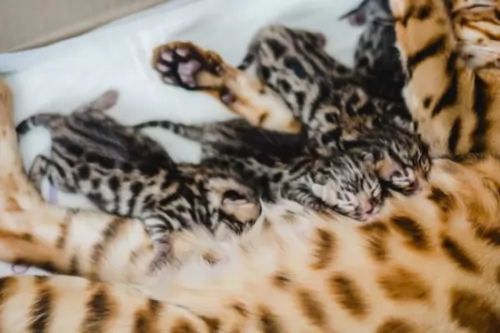 Hypertrophic cardiomyopathy (HCM) is a concern with the Bengal cat breed and this is a disease where the heart muscle becomes thick and unable to pump blood properly.
Hypertrophic cardiomyopathy (HCM) is a concern with the Bengal cat breed and this is a disease where the heart muscle becomes thick and unable to pump blood properly.
It’s a common genetic disease in Bengal cats. Cats used for breeding need to be screened each year to ensure no hypertrophic cardiomyopathy is present.
Another problem with the Bengal cat is Progressive retinal atrophy or PRA. Anyone wanting to breed Bengals should have their cat tested for this eye disease as the disease can lead to blindness.
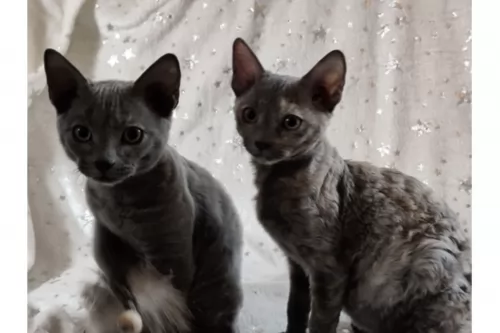 With excellent care and lots of love and attention, your German Rex can reach up to 17 years of age. They aren’t prone to any particular diseases, but diet plays a massive role in their health.
With excellent care and lots of love and attention, your German Rex can reach up to 17 years of age. They aren’t prone to any particular diseases, but diet plays a massive role in their health.
Remember that obesity is a major disease and it in itself can contribute to a host of other illnesses in cats and shorten its life. Excess weight contributes towards arthritis and diabetes and just losing a bit of weight can contribute towards increased mobility.
Dental disease is a common, chronic problem and you need to ensure your pet’s diet promotes dental health. It can be extremely stressful for your cat to have his teeth brushed, but in the case of chronic dental infection, get your pet to a vet.
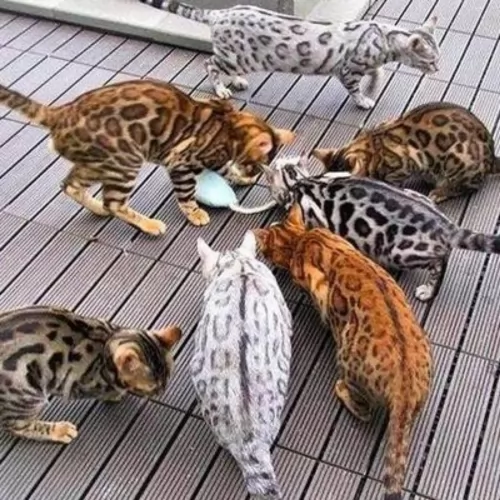 You will need a secured outdoor area for your Bengal cat where he can play and climb. He will need these for his activity levels as well as stimulating toys.
You will need a secured outdoor area for your Bengal cat where he can play and climb. He will need these for his activity levels as well as stimulating toys.
Provide feeding and water bowls and also make sure that you provide your Bengal with a shallow swimming pool as this cat loves water.
The Bengal is a healthy cat breed so it is important to provide your pet cat with the best food there is and to ensure he gets checked out at the vet every year.
Most hybrid breed owners provide raw food as these cats are often sensitive to commercially manufactured food. Having said that, there are high-quality prepared cat foods that will provide your Bengal with everything needed for a healthy life.
Look at providing your pet with a good supplement to ensure your furry friend has every chance to be healthy and happy.
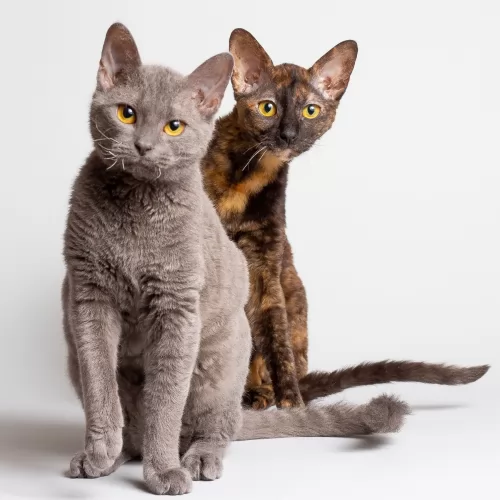 The German Rex is a shorthaired breed so a gentle brush once a week will be quite adequate.
The German Rex is a shorthaired breed so a gentle brush once a week will be quite adequate.
As you groom your German Rex, feel for any unusual lumps and make sure there are no signs of sores or rashes on your cat.
Check inside his ears for wax and dirt buildup and signs of redness for infection. If you don’t like to clean the inside of your cat’s ears, there are professional cat groomers and your local vet who will do this for you.
Make sure you feed your Rex the best cat food there is. When you look at the commercially cat manufactured foods there are, you’ll notice that there is dry kibble for cats as well as wet-type foods.
Through trial and error, you’ll learn what your cat likes, but your vet can offer valuable information on what is essential in a cat’s diet. Cats are carnivores so that means their diets have to be high in meat – protein – and low in carbohydrates.
Check out the best cat foods there are – the ones that have all the vitamins and minerals your cat requires to remain healthy.
Provide your cat with a litter box and keep it meticulously clean, scooping out the cat droppings every day and changing the actual sand or grit regularly.
Provide your cat with a warm bed, food and water bowls, toys, collar, and tag, climbing tree and scratching post.
Your kitten must start their first vaccines between 8 and 12 weeks of age. Your kitten will also be dewormed.
Take your cat to the vet when he is sick.